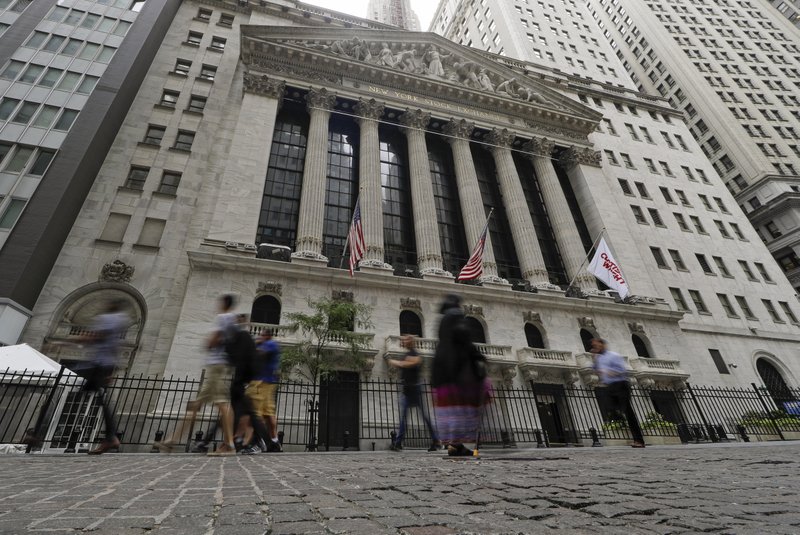National
Stocks slump broadly as expanded US-China tariffs kick in

Technology companies drove a broad slide in U.S. stocks Tuesday as disappointing economic data and the latest escalation in the trade war between the U.S. and China put investors in a selling mood.
The Dow Jones Industrial Average slumped more than 300 points as the market gave back some of its gains from last week. The S&P 500 snapped a string of four straight weekly declines last week, but still ended August with its first monthly loss since May.
The sell-off came as markets opened after a long weekend to expanded tariffs between Washington and Beijing.
On Sunday, the U.S. started charging a 15% tariff on about $112 billion of Chinese products. China responded by charging tariffs of 10% and 5% on a list of American goods.
Technology companies accounted for much of the decline. The sector is particularly sensitive to swings in trade relations with China and tariffs have the potential to drive up costs for gadget and chipmakers. Apple, which relies on China as a key part of its supply chain, fell 1.6%, while chipmaker Nvidia dropped 2.2%.
Industrial stocks were among the biggest decliners. Caterpillar, which is seen as an industry bellwether when it comes to the impact of trade, fell 1.9%.
Oil prices dropped 2.1%, dragging down share prices for energy stocks. Chevron slid 1.5%.
Investors fled to safer holdings, including utility stocks, bonds and gold.
Utilities held up well, as did with makers of consumer products such as Procter & Gamble, which added 0.6%. The price of gold climbed 1.7%. Gold producer Newmont Goldcorp also gained 1.2%.
Bond prices rose, sending yields lower. The yield on the 10-year Treasury fell to 1.47% from 1.50% late Friday. The lower bond yields weighed on banks. Bank of America lost 1.9%.
The surge in demand for U.S. government bonds came as new U.S. manufacturing data stoked fears of an economic slowdown. Factory activity in the U.S. last month fell short of economists’ forecasts and shrank for the first time since August 2016. Businesses are increasingly wary of investing and expanding because of uncertainty surrounding the U.S.-China trade dispute.
KEEPING SCORE: The S&P 500 was down 0.8% as of 3:18 p.m. Eastern Time. The Dow Jones Industrial Average fell 305 points, or 1.2%, to 26,098. The average was briefly down 425 points.
The Nasdaq fell 1.2%. Smaller company stocks also fell sharply, sending the Russell 2000 index down 1.7%.
Major indexes in Europe fell broadly.
TRADE WAR EXPANDS: The latest escalation in the lingering trade war has been expected since early August when the U.S. announced plans for the new tariff measures, prompting China to retaliate. The worsening trade situation between the world’s two largest economies dragged the S&P 500 to its second monthly loss of the year in August and dented investors’ confidence in global economic growth.
The U.S. and China are supposed to meet in September to continue trade negotiations, but investors have grown pessimistic that any resolution will be forthcoming in the near future.
ECONOMIC RED FLAG: The Institute for Supply Management, an association of purchasing managers, said Tuesday that its manufacturing index slid to 49.1 last month, from 51.2 in July. Any reading below 50 signals a contraction. That’s the lowest for the index since January 2016.
A global softening in demand, worsened by the increasingly high-risk trade war between the U.S. and China, appears to be hurting American manufacturers. More than half of the public comments from companies surveyed by ISM pointed to economic uncertainty as a drag on their businesses.
Investors have been worried that the trade war and a slowing global economy could tip the U.S. into a recession. The bond market has been reflecting these fears, with long-term bond yields falling below short-term ones, a so-called inversion in the U.S. yield curve that has correctly predicted previous recessions.
The yield on the 10-year Treasury has been hovering near or below that of the 2-year Treasury yield, which on Tuesday dropped to 1.47% from 1.49% late Friday.
BRITAIN AND BORIS: European stocks fell and the British pound dropped to its lowest level against the U.S. dollar in 34 years, excluding a brief “flash crash” in 2016 that may have been caused by technical glitches, as the U.K. faces a potentially chaotic exit from the European Union.
Prime Minister Boris Johnson’s office said he would call an early election if his opponents pass legislation that would block his plans to leave the European Union by an Oct. 31 deadline.
PROS FOR CONN’S: Conn’s jumped 18.2% after the furniture and electronics retailer blew past Wall Street’s second quarter profit forecasts. The company also topped analysts’ revenue expectations.
DELAYED FLIGHT: Boeing dropped 2.7% after United Airlines and American Airlines took steps to delay until December the expected return of Boeing 737 Max jets.







